Bourke Ulick J. Easy lessons, or Self-instruction in Irish / Легкие уроки: самоучитель ирландского языка
Подождите немного. Документ загружается.

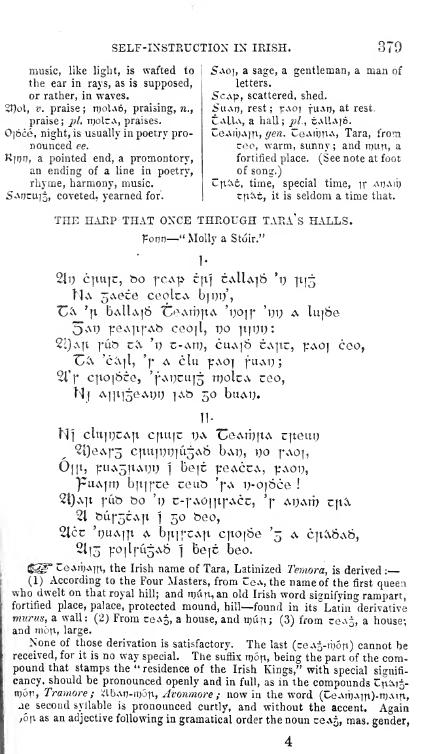
SELF-INSTKUCTIO^-
IX
IRISH.
music,
like light, is
wafted
to
the
ear in rays, as is
supposed,
or rather,
in
waves.
2i)ol, V. praise ;
njoUxó, praising,
n.,
praise; pi.
tt)oI-a, praises.
Ojócé, night, is usually in poetry pro-
nounced ee.
Rjnn,
a pointed end, a promontory,
an ending
of a
line
in poetry,
rhyme, harmony, music.
Saocu]5, coveted,
yearned for'.
379
5ao],
a
sage,
a
gentleman, a
man
of
letters,
ScAp,
scattered,
shed.
SuAt),
rest
;
^.\o^
fuAn,
at
rest.
caUa,
a
hall;
7;/.,
caUajo.
CeATÍjAiti,
(/en. CeAii^riA, Tara,
from
-eo, warm, sunny; and
njutt, a
fortified
place. (See
note at foot
of song.)
Cftixc, time, special time,
ir
AnAii^
ctii\t,
it
is seldom
a
time that.
THE HAPiP THAT OXCE
THPtOUGH
TARA
S HALLS.
porjP
—
"
Mollv a Stóir."
21r)
c|tii]c,
bo
I'CAp
i]i']
Cv\IIa]6
'1;
]t|3
t^A
jAece ceolcA
h]\v),
3<M)
-peAjii-Ab
ceo]l, t)o
it]T;i):
2l)Att fiib
CCV
'l) C-AH),
CUA]6 CA]1C,
pAO] CCO,
"Civ 'c;\]l,
']•
A
clu
|rv\oi
fuAr)
;
2lY
cfioióce, 'f^w^zu]-^
n^olcA
ceo,
Mj
Ai|i]5eA!)r)
i<\b
50
buAi).
11-
Hi
cluiOCAfl CfXlllC
T1A
"CeA^itA
ciieiii)
^
2i)eA|-5
c)iuii)i;iÚ5<n6
bv\T),
i)o
yc.0],
Oiti,
puA5]iAt:)i)
Í
befc
|:ev\ccA,
-pAor»,
puAirr)
bft]|*ce
ceub
'|*a T;-o]óce
!
2l)A|t
rub
bo
'v
c-rAOi|i|-ACc,
'r
auattj
cftiv
21
búf5CA|t
Í
50
beo,
2lcc
't;uA]|t
A
b|x]|-cA|i
c|i0|óe
'3
a
c|i;x6a6,
2I13
P^^lM'i^o^'*'^
1
^^I^
t)eo.
(^g° CcAiijAiri,
the
Irish name
of Tara,
Latinized
Temora,
is derived
:
—
(1)
According
to
the
Four Masters,
from
Cca,
the
name
of
the
first queea
who
dwelt on
that
royal
hill;
and
nji'm, an old
Irish
word
signifying
rampart,
fortified
place,
palace,
protected mound,
hill—
found
in
its
Latin derivative
murus, a
wall:
(2)
From
ceAj, a house,
and
n;ún;
(3)
from
ceA5,
a
house;
and n)óiA,
large.
None of those
derivation
is satisfactory.
The last
(ceA5-tbóri)
cannot
be
received,
for it
is
no
way
special.
The
suffix
njóri,
being
the part
of
the
com-
pound that stamps
the
"
residence
of the
Irish
Kings,"
with
special signifi-
cancy.
should
be
pronounced openly
and
in
full, as in the
compounds Zy\.\^r^-
njór,
Tramore
;
ilbAr)-rt)óri,
Avonmore
;
now in
the word
(CeATnAitx).n)Aift,
je
second syllable
is
pronounced
curtly,
and
without
the accent.
Again
,ó\\
as
an adjective
following
in
gramatical
order the
noun
ceATj,
mas.
gender,
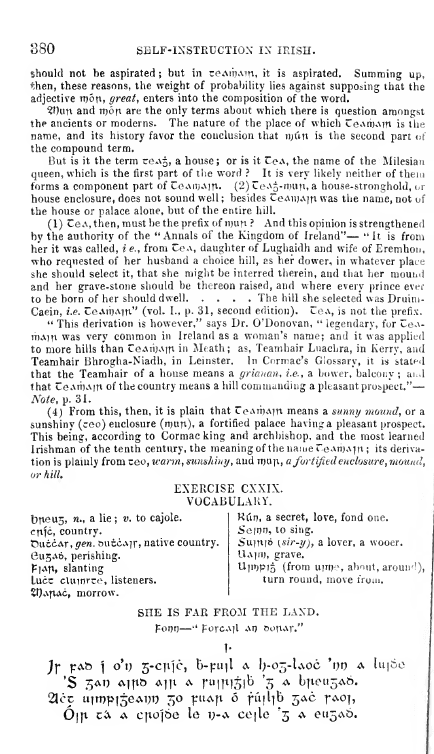
380 SELF-IXSTKUCTIOX IN
IRISH.
should not be
aspirated
;
but in ceAitiAin,
it
is aspirated.
Summing
up,
then, these
reasons, the
weight
of
probability
hes against
supposing
that
the
adjective
njón,
great, enters into the composition
of
the
word.
?i}un
and
mon
are the only terras
about
which there is
question
amongst
the
ancients or moderns.
The nature of the
place of which
ce.xnjAin
is the
name, and its history favor
the conclusion that
njún
is the
second
part
of
the
compound term.
But is it
the
term
ce^s,
a
house; or is it CeA, the
name of the
Milesian
queen,
which is the first part
of
the
word
? It is
very
likely
neither
of them
forms
a
component
part of
CcAnjAin.
(2)
CeAa-nniti,
a house-stronghold,
or
house
enclosure,
does
not sound
well
;
besides
CeAnjAjn
was the name,
not
of
the
house or
palace
alone,
but of the entire hill.
(1)
CeA,
then,
must be the
prefix
of njun
?
And
this
opinion
is strengthened
by the
authority of
the
"
Annals
of
the Kingdom of
Ireland"
—
"
It
is
from
her
it
was
called,
i
e.,
from
Coa, daughter
of Lughaidh
and wife
of Eremhon,
who
requested of
her
husband a choice hill, as
her
dower,
in whatever
place
she
should select
it,
that she
might
be
interred therein,
and
that her
mound
and
her
grave-stone
should
be thereon raised,
and
where every
prince
evef
to
be
born
of
her should
dwell The hill
she
selected was
Druini-
Caein,
i.e. CeAii)Ain"
(vol. I.,
p.
31,
second
edition).
CeA,
is not
the prefix.
"
This
derivation
is
however,"
says Dr. O'Donovan,
"
legendary,
for CeA-
mAitt
was
very common
in Ireland as
a
woman's name;
and it was
applied
to more
hills
than ceArijAiri
in Meath;
as,
Teamhair Lnaclira,
in Kerry, and
Teamhair
Bhrogha-Niadh,
in
Leinster. In Cnrmac's
Glossary, it
is stated
that the
Teamhair
of a
house
means
a grianan. i.e., a bower,
balcony
;
ai.d
that
CeAmAin
of
the
country means a
hill commundmg
a pleasant
prospect."
—
Note,
p.
31.
(4)
From this,
then,
it
is
plain
that reAirjAjn means
a
sunny mound,
or a
sunshiny
(ceo)
enclosure
(njun).
a
fortified palace
having
a pleasant
prospect.
This
being,
according
to
Cormac king and
archl)ishop,
and the
most learned
Irishman
of
the tenth
century,
the meaningof
thenanier.eAmAirt
;
its deriva-
tion is
plainly from ceo,
u-arm,
sunsliiny, and
njuTx,
a
fortified
enclosure,
mound,
or
hill.
EXERCISE CXXIX.
VOCABULAUY.
Kun, a
secret,
love, fond
one.
Seinn,
to
sing.
5uiTt]ó
[sir-y),
a lover, a wooer.
Uaih),
grave.
U]n)pio
(from
uuDe,
about,
arouii''),
turn round,
move
from.
t)tieu5,
n.,
a lie
;
v.
to
cajole.
cnfc,
country.
tiuccAf,
gen.
succAir,
native
country
eu5Aó,
perishing.
F]Att,
slanting
Luce cluinrce,
listeners.
Sl^AitAC,
morrow.
SHE
IS
FAR FROM
THE LAND.
Tom
—
''
porcAji An
softAr."
)X
PA& Í
OX)
S-cnlc,
b-puil
<x b-o5-l<^oc
'tjo
a
lu|óe
'S
5An
AiTib
Ai]t
A
]-u||t]5|b
'5
a
b|ieu5AÓ.
2lcc
uirnpiseAW
TJO
puA|t
ó
fi'Mll'^
5^^
r^o]»
Oiit
civ
A
cjtojóe
le ij-a ce|le
"5
a
eiJ5AÓ.
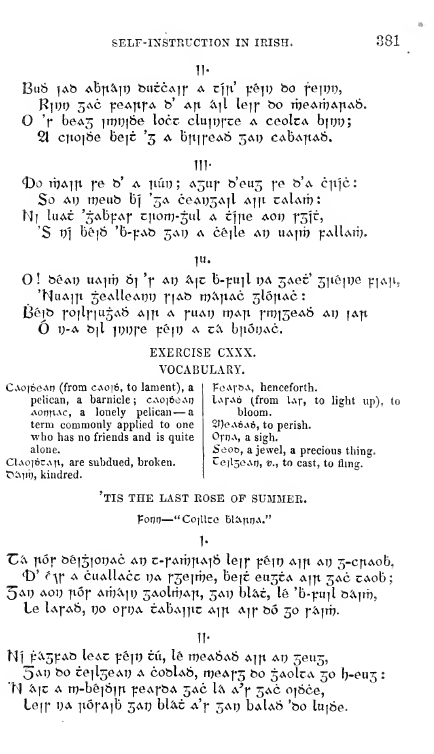
SELF-INSTRUCTION IN
IRISH. 381
11-
B11&
]Ab
Ab]t5v]i7
feucc<xi|* A
ciit'
pé]i) bo
fe]r)V,
H]\)\)
5AC
^eA]t]*A b' A|t
ii]l
leif
bo
TÍ7eAn)A]tA6.
O
'r
beA5
]WV]^&
locr
clujur^s ^
ceolcA
b|r)i);
21 cno]6e
be]C
'5
a
bftjfeAÓ
5Ar) CAbA|tA6.
m-
<t)o
rbAiit
fe
b'
A itúi)
;
a5U|' b'eu5 ye
b'A
c|tic
:
So
At)
rneub
b] '5A
ceAi:)5A]l A]|t
caIatt} :
Ml
luAc
'jiAbiJA]*
citoir)-5ul A
qjte aot)
fsic,
'S
1)1
b&|6 'b-pAb 5AI)
A
c&ile
at?
uaití?
paUatt}.
!"•
O!
béAt) uA]n)
0]
y
Ai) iv|c
b-]:uil
t)A
^agc
3|té|i)e
piA|i,
'NuAin
5eAlleAi)t)
]*iAb
rniVjiAC
5ló|tAC :
Béib
|*0]1|*|U5a8
A]|t A
fUAi;
n)^]i
ftT)]5eA6
at)
jAfi
O
i;-A
b|l ]T;i)|'e
p&iT)
A
c^ bjiooAC.
EXERCISE CXXX.
VOCABULARY.
PeAif
A,
henceforth.
LaP^xd (from
lAf,
to
light
up), to
CAojóeAn
(from
caoió,
to lament),
a
pelican, a
barnicle
;
cAojoeAn
x\ont^Ac, a
lonely pelican —
a
term
commonly applied
to one
who
has no friends and is
quite
alone.
ClAoióCAri,
are
subdued,
broken.
tii\irt),
kindred.
bloom.
St)eAóAó,
to
perish.
Oyn-S;
a sigh,
5eoD,
a jewel,
a
precious
thing.
reilaOAD, v., to
cast,
to
fling.
TIS
THE LAST
ROSE
OF
SUMMER.
Vom
—
"CoiUco
bUxftnA."
1-
"Civ
|tór
béi5ior)AC
at?
c-|*ATb|tAi6
le]f
^&it)
A^tt
ai) 5-c|tAob,
<t)'
(•'W
A
cuaUacc
t;A
rseinje,
be|c
eu5CA
a]|i
5AC cAob;
5At; Aoi)
]xóy
ATTjívii) 5AolrbA]t,
5A1)
bUc,
lé
'b-piil
b^im,
Le
Ia]*a6,
130 o|*f;A cAbA]]tc
ai|i
A]|*
bo
50
yi>i]xr).
11-
Mi
fiv5pAb
leAC yé]r) cú, lé
njeAÓAÓ
A]]t
au
36113,
3<^r)
bo re]l3eAT)
a
cobUb,
nje^y^
bo
5AolrA
30
b-eii5
:
'M
ÍVIC
A
ti7-béi6]|t
^eAfbA
3AC lív
A^f
3^6
o]bce,
leii^
UA
]iófAib 3At)
bUc
A'f
3At)
bAÍAÓ 'bo
lu|be.
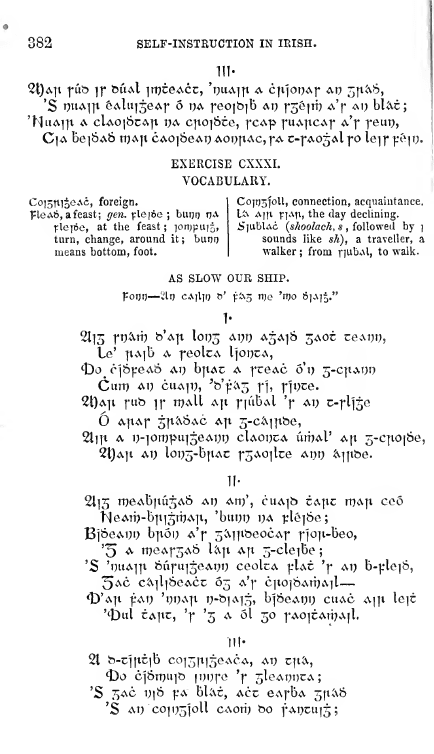
382
SELF-INSTRUCTION IN
IRISH.
Ill-
2t)<v|t
fub
If
feviAl
irnceACc,
't;UA]]t
A C|XiOt)<V|*
At)
5|ii^8,
'S
t)UAi|v
éAlu]5eAf
5 tjA
feo)b|b
ai)
t*5é|m
A'f
ai)
blivc;
'MuAiji
A cIaoiOcaji
i)a
C]t0]&ce,
I'CAp I'UAitcAf
a'i*
feuTj,
CjA
bejÓAÓ
n)A]t
CA0|6eAr)
Aoi)|tAc,fA
c-fA05AlfO
le^f
feji;.
EXERCISE CXXXI.
VOCABULARY.
Co]5ttioeAc,
foreign.
)íleA6,afeast;
gen.
flefoe
;
butjt)
t^A
i:le]óe,
at the
feast;
lon^puij,
turn, change,
around it;
buno
means
bottom,
foot.
Coit)5foU,
connection, acquaintance,
U\ A]ti
rjAn»
the
day decUning.
5iublAc (shoolach,
s
,
followed by
)
sounds
like sh),
a
traveller,
a
walker
;
from
riut>Al,
to
walk.
AS
SLOW OUR SHIP.
T^oijt)
—
ill)
cAiljt)
ft'
p;\5
TT)e
'njo
ojai^."
1-
2li5
f'?^"'
^'^1^
^^'^3
'^^^
<^5*1^
3<^oe
cev\i)n,
Le' ]tAib
A
]*eolcA Ijo^cA,
C)0
CÍÓ^-eAÓ At)
bjlAC
A
fCeAC
ó'l) 5-C|tA1)I)
CuiD
AU
cuA]!),
'^'f^'S
ri?
TlDce.
2t)Aii
yiity
]y
ttjaU
A]t
]*iúb<\l
Y
ai)
c-flige
Ó
A]tA|*
5]tix6AC A^t
5-civi]tbe,
2liTi
A
i;-ion)pu]5eAT)T)
clAOt)CA
úrbAÍ' a|i 5-c|tO|6e,
iJt)A]t AT)
loi)5-bjtAC
]*5Aoilce
Ai)t)
i^ijtbe.
II-
21)5
tDeAbjtúJAS
At) Art)',
cuA]í3
cA.]ic
n)<\|t ceo
'HeATT)-b|ii5rbAjt,
'but)t) t)A
T:lé]6e;
Bí6eAi)t)
bjiói)
A'f
5í\i|tbeocAr fío|i-beo,
'3
^
rt)eA|*5A6
l^ji
Aft
5-cleibe
;
'S
't)iiAi|i
óú|*u]5eAi)i) ceolcA
^Iac
'f
at)
b-|:le|6,
3ac
c^]li6eACC
05
a'i*
c)to|ÓAtt)v\il
—
^'a|i
f:Ai)
'i)t)A|i
t)-b]Ai5,
l>íóeAt)i)
cu<\c
Ajji lejc
'í)lll CAjtC,
'X
'5
A
ól
50
]*AO]CAri)All.
ni-
si
b-qftcjb
coi5|ti5eACA,
At)
c|ta,
<Do cí6rr)uib
[DDfo
'y
5leAt)t)CA;
'S
5AC
t)|6
jíA
bU\c,
Acc
eAfbA 5ltívb
'S
At)
co]i)5íoll CAOTÍ) bo
fAi)cu|5;
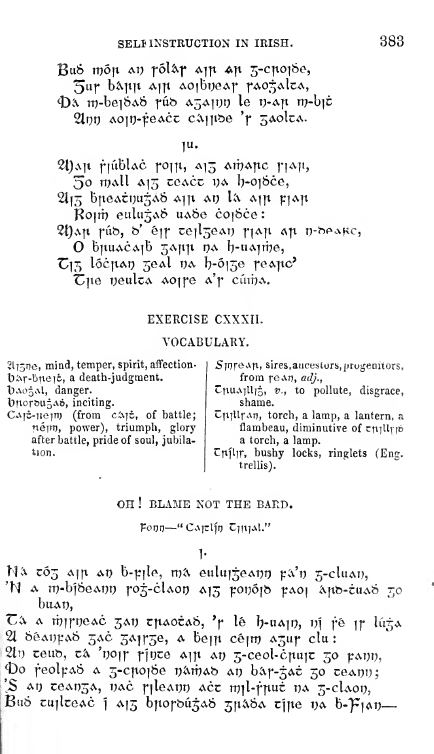
SELí
INSTRUCTION IN IRISH.
383
Bu8
Tt)ó|t
AT)
i-ólívT
Ai|t
A|i
5-c|toi6e,
3ur
b^jtii
Ai|t
AOibrjeAj* i^ao^aIca,
i)C\
jD-bei^AO
]'úb
A5AiT)r)
le
r)-A|t
n)-bic
2lr)r)
AOit)-f:eACc
civijtbe
'f
5A0ICA.
2t)A]l
flllblAC
fO]|V,
A13
AlT)A]tC
|'IA|l,
5o
ttjaU A15
coACc
t)<v
h-o]Sce,
2li3
btieAcou^Áó
ATjt
ai?
\ix
a^ji p]A]t
Koirt)
euluJAi?
UA&e
coi6ce:
?t)v\jt
|*úb, b'
é]f
cejlseAT)
f]A|t
aji
t7-bp<xHc,
O
bjiuACA^b
SAjt^i
t)A
b-"<^lri7e,
"Cij
lóc|tAt} 5eAl r)A
b-ó|3e
feAfic*
T^iie
TjeulcA
AO]fe
aY
cúiíía.
EXERCISE CXXXII.
VOCABULARY.
2ll5ne,
mind,
temper,
spirit, affection-
b^r-bnei^,
a
death-judgment.
IjAOaAl,
danger.
brior&UoAó,
inciting.
CAjc-Tie^n) (from
ci\]t,
of
battle;
né]n},
power),
triumph, glory
after
battle, pride
of
soul, jubila-
tion.
5)nre»iTt,
sires, aucestors,
progenitors,
from
re
AD,
adj.,
CrtuA]Uj5, v., to
pollute,
disgrace,
shame.
Cttjllr^i), torch,
a
lamp,
a lantern,
a
flambeau,
diminutive
of
cnjUrió
a torch,
a
lamp.
Cnflin
bushy
locks,
ringlets
(Eng.
trellis).
OH !
BLAME
NOT
THE
BARD.
^=000—
"CAjrlfrj
CjniAl."
]•
MCv
CÓ5
A|fi
Ai) b-p]le,
miv
euluijeAT)^
^ii'v
5-cliiAT),
'M
A
rt)-bí6eAT)t)
f05-clA0i) a]3
^oi)ó|b
fAO|
í\|tb-ciiAÓ
30
buAt),
T.'^ A n)]yr)eAC
3AT)
r|iA0CA6,
'f
le
b-UAiD,
V]
f'e
]y
IÚ3A
21
ÓéAUfAÓ
3AC
3A]i*3e,
a
be||t
céjrr)
a3u|*
clu
:
21t)
ceub,
civ
'vo]y
X]\)te
A]|t
at; 3-ceol-c]tu]c
50 ^m)v,
i)o
feolpAÓ A
3-cito|6e
ijixrbAb
At) bíví'-5Ac
30
ze^v)});
'S
AT)
reAn5A,
t>AC
fileAn)!)
acc
TTjil-fjtuc
T)A
3-clAor),
Bub
cu]lceAC
Í
A|5
b|iofbÚ3A6
3ftí\ÓA
q|ie
i;a
b-'p]Ar)
—
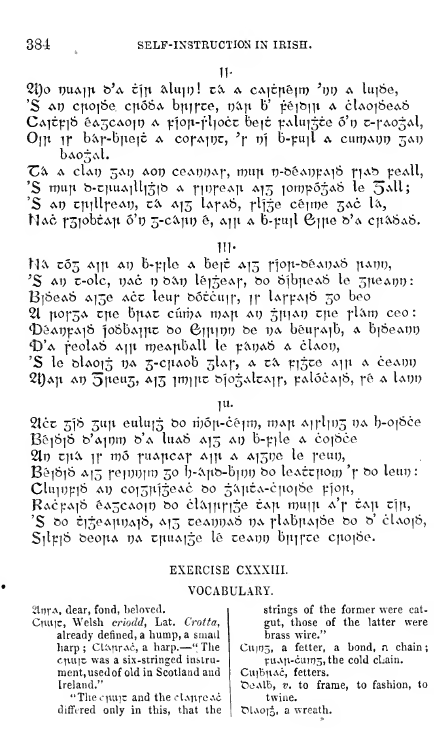
384
SELF-INSTRUCTION IN IRISH.
II-
2i)o
T)UAi]t
bV
i']]x
ivluit)!
civ
a
CAicftejii)
^1)1)
A
lu]6e,
'S
At)
C|tO]8e cjióÓA
b]i.|f*ce,
r)'<x^ b'
freifeiji
A
clAOjoeAO
CAicpi8
éA5CA0ir)
A
fio|t-fl|occ
be|c
|:Alii]5ce ó'r)
c-]*ao5aI,
0||t
Ti*
b4\|*-b]ieic
A
cofAiuc,
^f
x)]
b-pu]l
a
ciirt)Ai)Tj 5AI)
bA05Al.
'Civ A
cIat)
5AI) AOt)
ceAUOAf,
rt7U|i
r)-béAi)pAi6
]*^Ab ^reAll,
'S
TTjufi
b-cftuAill|Jib
A
f]r)feA|t
a^^
|0rT)pó5A6 le
5^^U
'S
AT)
cjtiUfeAi^,
civ
A]5 Ia]-aÓ, ]*lí3e
cé]we
5AC
liv,
I^AC
f5]obcA|i
ó'r) 5-civ]tt)
é,
a^ji
a
b-^-nijl Q>]]ie b'A cytivOAO.
Ill-
H'A
CÓ5
A]|t
AT) h']:]\e
A
bejc
ai5
fíojt-béADAÓ
^tAW,
'S
AT) c-olc,
T)AC
t)
bivT)
lé|5eA|*,
bo
bíbiteAÓ
le
5fieA0tj
:
BiÓe<v6
Ai3e
acc
leu|-
bócciin*,
]T"
Ia|*|:ai6 50
beo
21
|iof*5A
c|te b|tAC
cÚTbA
Tt7A|i AT)
5fTiAT)
c]te
flivm
ceo
:
<t)éAT)].*A]6
ío6bA]|tc bo
6nt]T)t)
be t)a
béu|*Aib,
a
bjoeAT)!)
Í)'a
feolAÓ
Ajji TrjeA|ibAll le
-pivijAO
a
cIaoi),
'S
le
blA0i5
T)A
5-ciiAob
sIa]-,
a tis.
f)5ce
A]it
a ceAOT)
2^Ait
AT) 3peu5, A15
ir^iitc
b]o5AlcA]f, pAÍócAiÓ, yé
a
Iaiju
111.
2lcc
5Í6
5u]t eulu|5 bo
TÍjó|a-céiiD,
rr)A|i
Aifl|i)3
ua b-oi6ce
B&i6]ó
b'AiT)rD
b'A
Iua6
A15
ai)
b-f]le
a
co]óce
2lt)
c|tiv
]y
TTio
|*uA|icAf
Ai|i
A
A]5T)e le
feut),
Béibió
A13
ye]}V)]W 50
b-i^l^b-bjut)
bo
leACc|xorn
'f
bo lem;:
CUi^i^pio
Ai)
co]5|tí5eAc bo 5í\]tcA-c|ioióe
píojt,
Rac}:a]6
éA5CA0iT)
bo
cUv||tfi5e
CA|t TDupt a']*
CA]t
cifi,
'S
bo
c]5eA]H)Aib,
A13 ceAi;i)Ab t)v\ ]*lAb|iAióe
bo
b' cIao|6,
Silpjó
beojTA T)A
cjtuAige
le ccaot;
bfiifce
C]aoi6e.
EXERCISE CXXXIII.
VOCABULARY.
SlnVA,
dear,
fond,
beloved.
CniMc,
Welsh criodd,
Lat. Crotta,
already defined,
a hump,
a small
harp
;
CU%i^rAc,
a
harp.
—
"
The
CT\U!C
was
a
si.\-stringed instru-
ment, usedof old in
Scotland and
Ireland."
"The
ciutic
and the clAnroAc
differed only
in this,
that the
strings
of
the former
were cat-
gut, those of
the latter
were
brass
wire."
Cu|r)5,
a
fetter, a
bond,
a
chain;
];uAri-cuiT)5,the
cold cLain.
CaibitAc,
fetters.
t5eAlb, V.
to frame,
to fashion,
to
twine.
tilAoja,
a
wreath.
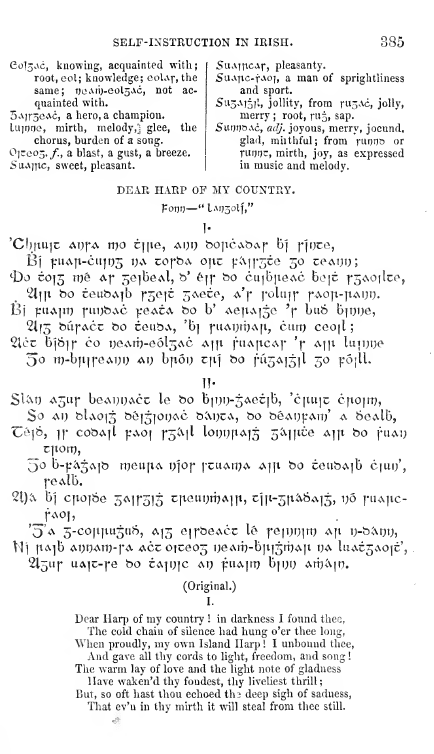
SELF-INSTRUCTION
IN IRISH.
385
eol3Ac, knowing,
acquainted
with;
root, eol; knowledge; eolAf,
the
same;
tjcAiij-eolsAc,
not
ac-
quainted
with.
3«\ir5eAc,
a
hero, a
champion.
lujuDO,
mirth,
melody,] glee, the
chorus, burden of a
song.
Ojceos,/., a blast, a gust, a
breeze.
SuAjttc,
sweet,
pleasant.
SiiAiricAf,
pleasanty.
SuATxc-f-AO], a
man
of sprightliness
and sport.
-SusAjgil,
jollity,
from
rUoAc,
jolly,
merry
;
root,
ru^,
sap.
5ui)pt)Ac,
adj.
joyous, merry,
jocund.
glad,
mirthful; from
r^nnt)
or
runt)r, mirth, joy,
as
expressed
in
music
and
melody.
DEAR HARP OF
MY
COUNTRY,
poijr)—
•'
LAHaOlf,"
Bj
puAit-ciqr)5
r)A co|*bA
o]ic
|:í\|f5ce 50
zeo-xyx)',
i)o
co]5
xx)h
Af
je^beAl,
b'
éjf
bo
cu]bfteAC
be]c
fSAOilce,
2l]|i
bo ceubA^b
f5e]C
5Aeée,
a'^
|*oliq|*
|*AO]t-itAi)i).
Bi
puA]n)
|'iu)bAC
peACA
bo b'
Ae|iAi5e
'f
bu6 bjTjije,
21)5
búfACc
ho
ceubA,
'b]
f
UAurbAfi,
curr)
ceo|l
;
2lcc
bíÓ^f
CO i;eAn)-eól5AC A]|t
fuAftcAf
'y
a]\\
luii)i)e
30
TT)-b]t|]*eAT;r) ai) b]tói)
z]i\ bo
fÚ5Ai5]l
50
fó]ll.
}}
SUvr)
A5iif
beAi)i)Acc le
bo
bii)i)-5Aec|b,
'cftiiic
c]\o\n},
So
Ai)
blA0i5
i3é]5loi;AC
bívr)CA, bo
béAOpArr/
a ÓeAÍb,
"Cejo,
]f
cobAjl
fAOj
f5^il
loi;i;fiA]5
5iv|]ti;e a^ji
bo
fuAt}
c]torT7,
30
b-|:<X5A]b rrjeujiA
i^ioj*
|TUAn)A
Aiit
bo
ceiibA]b
cim/,
I'eAlb.
2l)i\
b]
cjtoióe
SAirsiJ
c|teut)n7Ai]i,
ci|t-5|ta6Ai5,
i)ó
fLiA|tc-
'ó''<^
5-co|t|iu5ii6,
A]5
e||*beACC \h
xe]r)\)]^
A]t
r;-bAoi;,
W]
fXA^b
AT)r)Arr)-|*A
ACCoiceo5 i)eArT}-b]ii5rbA|t
oa
Iuac5A0|c',
2l5u|*
uA]c-fe
bo ca]ij]C
atj
fiiAjiT)
b|uo
Arr)<V|t;.
(Original.)
I.
Dear
Harp
of my
country
! in darkness I
found
thee,
The
cold chain of silence had hung o'er
thee
long,
When
proudly, my own
Island Harp !
I unbound thee.
And gave all thy cords to Ught,
freedom,
and
song
!
The wai-m
lay
of love
and
the light
note
of gladness
Have waken'd thy fondest,
thy
liveUest thrill
;
But, so oft hast thou echoed th3 deep
sigh of
sadness,
That
ev'n in
thy mirth
it will
steal from thee
still.
4*
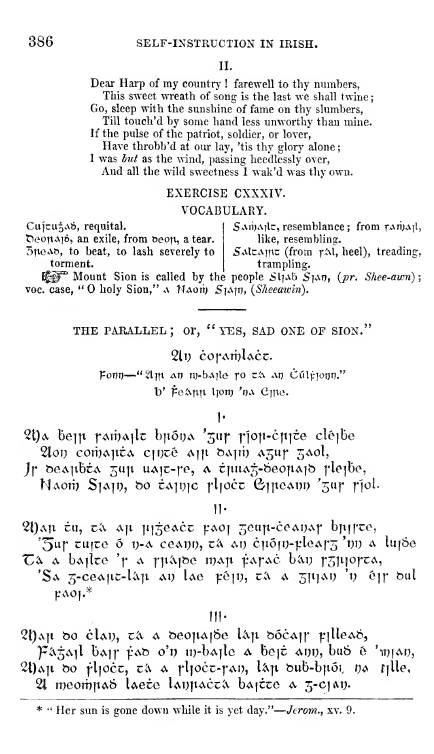
386
SELF-INSTRUCTION
IN IRISH.
II.
Dear Harp
of my
country !
farewell
to
thy
numbers,
This sweet
wTeath of
song is
the last we shall
twine
;
Go, sleep
with
the
sunshine
of
fame on
thy
slumbers,
Till touch'd
by
some hand
less unworthy than
mine.
If the
pulse
of the patriot,
solcher,
or
lover,
Have
throbb'd
at om-
lay, 'tis thy glory alone
;
I
was hut
as the wind,
passing heedlessly over.
And all the
wild sweetness
I wak'd was thy own.
EXERCISE
CXXXIV.
VOCABULARY.
CuícUoAó,
requital.
tieoTt^l»?
an exile, from
t5eota, a tear.
5neA&,
to beat,
to lash
severely to
torment.
SaiÍ)A]Ic, resemblance
;
from
t'^fbAil,
like, resembling.
SAlcAjnc (from
r-^l.
heel),
treading,
trampling.
^g^ Mount Sion is
called
by
the
people
SljAb
Sjatj, Qjr.
Shee-awn)
;
voc.
case,
"
holy Sion," a HAort^
5iA]t),
{Sheeawin).
THE
parallel;
or, "yes,
sad one of
sion.
2lt) COI^ATTjUcc.
V-om
—
"2liti
AH
n)-bA]le
r»
cCa
ao
Ci'iIvioot)."
b'
f^eivtiti
\]on) 't)Á
Cine.
1-
2t)<v
beijt ]*Ait)Ailc
b]iói;<v
'juf
fioyi-c|i]ce
cléjbe
2loT) corbA]tCA
C]i)cé a]]x
bA]n)
a5U|*
5A0I,
)X
beA^tbcA 5U|t
uAjc-fe,
a
c|tuA5-8eo|iAib
]*le]be,
N<\on)
SiAjij,
bo CA]T)]C
fl|occ 6i|teAT)t)
'5U|*
fjol.
n-
2l)<vit
cii,
civ
A|t
iijjeACx
pAO] 5eu]t-ceAt)Af
b|t||-ce,
'3ur
CHice
Ó
i;-A ceAi)u,
z'a
au
C|ióit)-pleA|*5
't)I)
a
lujóe
"Civ
A
bAilce
'i*
A
]']tiv|be h^a]!
fAfAC
bivi)
|*5it]0|*CA,
'Sa
5-ceA|ic-U|i
Ai) Ue
^reji), ci\
a
SJtiAij
'1?
6if
bul
pAO].*
Ill-
21)a|i bo
cIat), civ
a beo|íAi6e
lív]i
bócAif
^jlleAÓ,
PÍV5A1I
bAii'
f^^
<^''^
n)-bA]lo A be|C
ai)I),
bu6 'e
'irjiAt),
21)a|i ho
f-liocc,
civ
A
fljocc-T'AU,
lívjt
bub-b|iói.
t)A
í]Ue,
21
TDeorbjiAO ÍAece
Iat)]iaccív bA|Cce a
5-cjMj.
*
"
Her sun is gone
down while
it
is yet day."
—
Jerom., xv. 9.
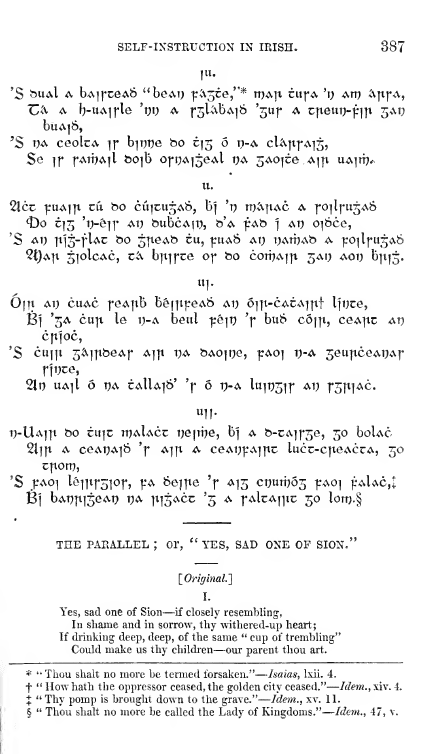
SELF-IXSTRUCTION
IN
IRISH.
387
lU.
'S
ííuaI
a
bAji'ceAÓ
'*bev\i)
fix5ce,"* nj^v.
cii|*a
'\)
att)
ívjifA,
Civ A
b-ii^ifle
'ijt)
A
f5U\bA]6
'511^
a
c|ieuT)-^||t
5Ar)
buA]6,
'S
i)A
ceolcA
^i*
bjTjDe
bo c]5
5 rj-A
cliv]t]-Ai5,
Se
II*
i-ArpAjl
bo^b
OfijAjseAl
t)a
5A0]ce
ajji
uA^n;,
2lcc
puAiji
CÚ
bo
CÍÍ1C115A6, h]
't)
mivTiAC
a
]*0]lfU5A6
i)o
c]5
'T)-&lf
Au
bubcAit),
b'A
fAb
Í
At)
o]6ce,
'S
AT)
]tí5-f'lAC
bo 5]teAb cu,
|:ua6
At)
t)ArbAb a
^rojli-u^AO
2t)A|i
5iolcAC,
ci\
b|t]fce
o|*
bo corÍ7A|]t jaij
aot)
b|ti5.
iq.
OiT}
AT)
cuAC
-j-eAiib béntpeAÓ
atj
6i]t-CACA]|vt
líT)ce,
Bí
'3A
ciiji le
T)-A
beul ^é]X)
'y
bu& có||i,
ceAjtc
at)
cpioc,
'S
CU1]T 5iV]|XbeA|* A1]t
1)A bAOjTje,
fAO]
T)-A
5eU|TCeAt)Af
2lt)
UA^l Ó
T)A
CaIIa|6'
'f*
5 T)-A
luiT)5]f
AT)
f5|t]AC.
"II-
t)-Ua]]i bo tu]z
rtjAlAcc
T)eiTÍ)e,
bí
a
b-cAi|*5e,
50
boUc
2li|t
A ceAijA^O
']•
A^jt
A
ceAi)pA]|ic
lucc-c]teAccA,
50
c]ion),
'S JÍAO]
lé]|t]*5]0f,
|íA
6e|]te
'f
ai5
ct)UTT)Ó5
^ao]
f:Al<\c,+
Bí
bAt)|ii5eAt)
i)A
T115ACC
'5
a
t^aIcahtc
50
Iotd.§
THE
PARALLEL
;
Or,
"
YES, SAD
ONE
OF SION."
lOrigiiial.']
I.
Yes,
sad
one of
Sion
—
if closely resembling,
In
shaine and in
sorrow, thy withered-up
heart;
If drinking deep, deep, of the same
"
cup of trembling"
Could
make
us
thy childi-en
—
our parent thou art.
*
"Thou
shalt
no
more
be termed forsaken."
—
Isaias, Ixii. 4.
t
"
How hath the oppressor ceased, the
golden
city ceased."
—
Idem.,iáv.
4.
X
"Thy pomp
is brought
down
to the grave."
—
Ide7n., xv. 11.
§
"
Thou
shalt
no
more
be
called the
Lady of Kingdoms."
—
Idem.,
47,
v.
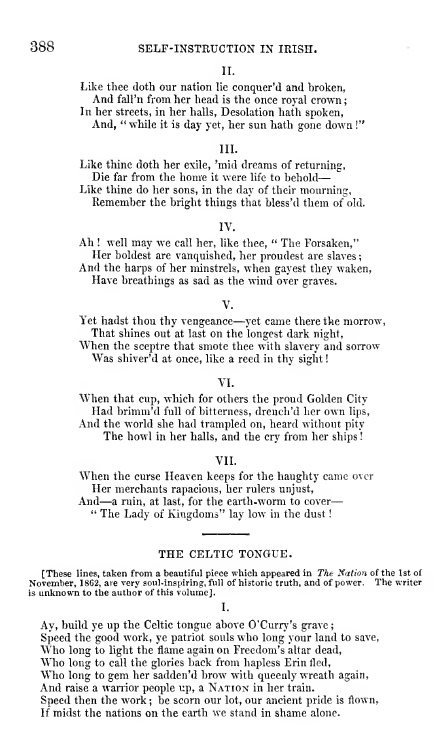
388
SELF-INSTKUCTION
IN
IRISH.
II.
Like thee doth
our nation lie
conquer'd
and broken,
And fall'n from
her head is the
once royal crown
;
In her streets,
in her halls.
Desolation hath
spoken.
And,
"
wliile it
is
day
yet,
her sun
hath
gone
down
!"
III.
Like
thine doth her exile, 'mid dreams
of returning,
Die far from
the hom'e it were life to
behold
—
Like
thine do her sons, in the
day of their mourning,
Remember the
bright things that
bless'd them
of
old.
IV.
Ah ! well may
we call
her,
like
thee,
"
The Forsaken,"
Her
boldest are
vanquished,
her proudest are
slaves
;
And the harps
of her
minstrels, when
gayest they waken,
Have breathings
as sad as the wind over graves.
V.
Yet
hadst
thou thy vengeance
—
yet came there the
morrow,
That
shines
out at last on the longest
dark
night,
When the
sceptre
that smote thee
with
slavery
and
sorrow
"Was shiver'd
at
once,
hke
a reed
in thy sight
!
VI.
When that cup, which for
others the proud Golden City
Had brimm'd
full of bitterness, di-ench'd her own lips.
And the world she had trampled
on, heard without
pity
The
howl in her halls,
and the cry from
her ships
!
VII.
When the curse Heaven keeps for the haughty came
over
Her
merchants rapacious, her rulers
unjust,
And
—
a ruin,
at last,
for
the
eai-th-worm to cover
—
"
The
Lady
of
Kingdoms" lay low in the
dust
!
THE
CELTIC
TONGUE.
[These
lines, taken from a
beautiful piece which appeared
in
The
Nation
of
the Ist
of
November, 1862,
are
very soul-inspiring, full of historic
truth,
and of power.
The writer
is
unknown to the
author of this volume].
I.
Ay,
build ye
up the Celtic
tongue above
0'Curn,''s grave
;
Speed
the good
work,
ye
patriot souls who
long your land
to save.
Who
long to
light the flame
again on
Freedom's altar dead,
Wlio long to call
the glories l)ack from
hapless Erin fled,
Wlio long
to gem
her sadden'd
brow
with queenly wreath
again.
And raise a wanior people
up,
a
Nation
in her train.
Speed
then
the work
; be
scorn our lot, our ancient pride is
flown.
If midst
the nations
on
the
earth we stand
in shame
alone.
